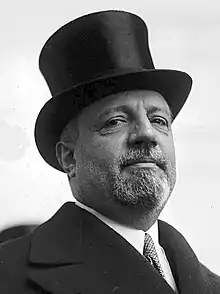Giuseppe Volpi
Giuseppe Volpi, 1st Count of Misurata (19 November 1877 – 16 November 1947) was an Italian businessman and politician.

_nave_left_-_Tombe_of_Giuseppe_Volpi.jpg.webp)
Count Volpi developed utilities which brought electricity to Venice, northeast Italy, and the Balkans by 1903.[1] In 1911–1912, he acted as a negotiator in ending the Italo-Turkish War.[2] He was the governor of the colony of Tripolitania[3] from 1921 until 1925.
As the Kingdom of Italy's Minister of Finance from 1925 until 1928, Volpi successfully negotiated Italy's World War I debt repayment with the United States[4] and with the United Kingdom,[5] pegged the value of the lira to the value of gold, and implemented free trade policies. [6] He was replaced in July 1928 by Antonio Mosconi.[7]
Volpi also founded the Venice Film Festival. His son was automobile racing manager Giovanni Volpi. His grand daughter is Countess Maria Cicogna, The New York Times describes her as "the first major female Italian film producer" and "one of the most powerful women in European cinema".
Notes
- "John Berendt, The City of Fallen Angels". Penguin Books, 2005. Retrieved 23 December 2010.
- "Volpi's Commission". Time Magazine. 2 November 1925. Retrieved 23 December 2010.
- "ITALY: Cabinet Changes". Time Magazine. 20 July 1925. Retrieved 23 December 2010.
- "THE CABINET: Italy's Debt". Time Magazine. 23 November 1925. Retrieved 23 December 2010.
- "Ratified". Time Magazine. 15 February 1926. Retrieved 23 December 2010.
- "ITALY: Back on Gold". Time Magazine. 2 January 1928. Retrieved 23 December 2010.
- "ITALY: Volpi Out". Time Magazine. 16 July 1928. Retrieved 23 December 2010.
External links
| Government offices | ||
|---|---|---|
| Preceded by Luigi Mercatelli |
Governor of Tripolitana 1921–1925 |
Succeeded by Emilio De Bono |
| Preceded by Alberto De Stefani |
Italian Minister of Finance 1925–1928 |
Succeeded by Antonio Mosconi |
| Business positions | ||
| Preceded by Alberto Pirelli |
President of Confindustria 1934–1943 |
Succeeded by Giovanni Balella |
